
The skimmers or perchers and their relatives form the Libellulidae, the largest dragonfly family in the world. It is sometimes considered to contain the Corduliidae as the subfamily Corduliinae and the Macromiidae as the subfamily Macromiinae. Even if these are excluded, there remains a family of over 1000 species. With nearly worldwide distribution, these are almost certainly the most often seen of all dragonflies.
Aethiothemis is a small genus of dragonflies in the family Libellulidae.
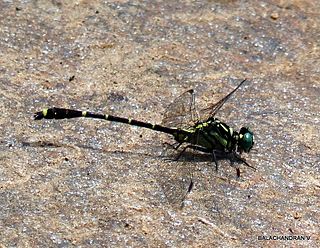
Burmagomphus is a genus of dragonfly in the family Gomphidae. It contains the following species:

Ceriagrion is a genus of damselfly in the family Coenagrionidae. Species of Ceriagrion are small to medium size, generally brightly coloured damselflies. They are found across the Old World, Africa, Asia and Australia.

Gynacantha is a genus of dragonflies in the family Aeshnidae. The females have two prominent spines under the last abdominal segment. This gives the genus name and the common name two-spined darners; they are also known as duskhawkers.

Heliogomphus is a genus of dragonflies in the family Gomphidae.
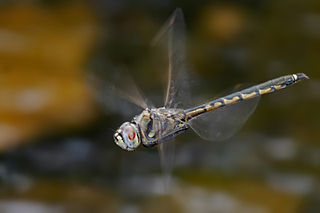
Hemicordulia is a genus of dragonfly in family Corduliidae. It occurs in Africa, southern Asia, Australasia and Pacific Islands such as the Bonin Islands, Fiji and French Polynesia. Species of Hemicordulia are small to medium-sized dragonflies, coloured black or metallic, with yellow.

Indolestes is a genus of damselflies in the family Lestidae. Species of Indolestes can be medium-sized, dull coloured dragonflies. They are found from India through Asia, Australia and the Pacific.
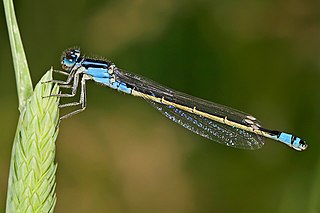
Ischnura is a genus of damselflies known as forktails in the family Coenagrionidae. Forktails are distributed worldwide, including various oceanic islands. The males have a forked projection at the tip of the abdomen which gives the group their common name.

Mortonagrion is a genus of damselfly in the family Coenagrionidae. It contains the following species:

Platycnemis is a genus of damselfly in the family Platycnemididae.

Prodasineura, the Asian threadtails, is a genus of damselflies in the family Platycnemididae. All the Afrotropical species formerly in this genus are now placed in Elattoneura, the African threadtails. Dijkstra et al. (2014) moved the genus from Protoneuridae to Platycnemididae based on molecular phylogenetic research.
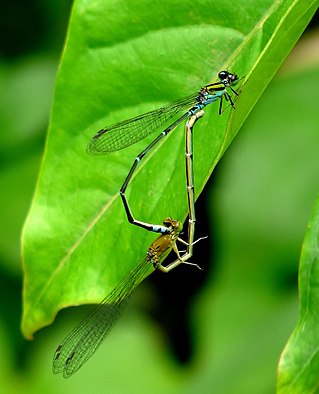
Pseudagrion is the largest genus of damselfly in the family Coenagrionidae, with over 140 species. Its range includes most of Africa, much of Asia, and Australia. Africa holds most of the diversity with almost 100 species. It has occupied most of the freshwater habitats in its range, and dominates damselfly communities in habitats as different as desert pools, equatorial rainforests and montane streams.

Rhinocypha is a genus of damselflies in the family Chlorocyphidae.

Teinobasis is a genus of damselflies in the family Coenagrionidae. Species occur in south-eastern Asia, Indonesia, Solomon Islands and Micronesia; one species, Teinobasis rufithorax, is found in Australia.

Zygonyx is a genus of dragonflies in the family Libellulidae. They are commonly known as cascaders because of their preference for living beside waterfalls and flying through the spray. They lay their eggs in wet dangling roots.
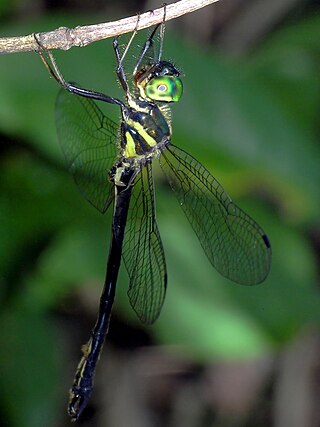
Idionyx is a genus of dragonflies in the family Synthemistidae, which is earlier treated as a subfamily of Corduliidae. According to World Odonata List, this genera is best considered incertae sedis.

Neurothemis intermedia, the paddyfield parasol, is a species of dragonfly in the family Libellulidae. It is widespread in many Asian countries. Four subspecies are recognized.

Coeliccia is a genus of damselflies in the family Platycnemididae. They are distributed in Asia from India to Japan to Indonesia. It is the largest genus in the family, with around 80 species.

















